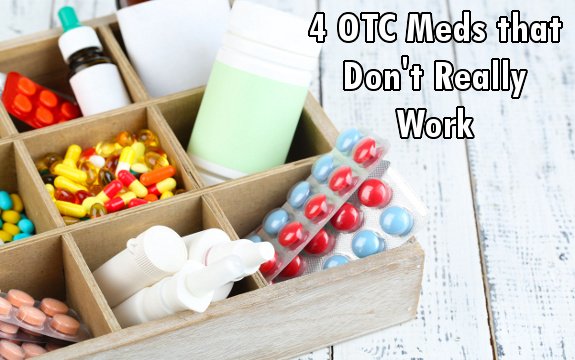These 4 Over-the-Counter Medications Don’t Really Work

 While anti-pharmaceutical sentiment seems to be growing online, nearly 70 percent of Americans are on at least one prescription drug. Even among those who shun prescriptions or simply try to avoid them except when absolutely necessary, there are vestiges of trust in the world of over-the-counter medications. Though while some medicines do indeed work (with side effects), many of these meds are worthwhile.
While anti-pharmaceutical sentiment seems to be growing online, nearly 70 percent of Americans are on at least one prescription drug. Even among those who shun prescriptions or simply try to avoid them except when absolutely necessary, there are vestiges of trust in the world of over-the-counter medications. Though while some medicines do indeed work (with side effects), many of these meds are worthwhile.
In 2013, U.S. consumers spent $33 billion in over-the-counter medicines. These are the antacids you take when you overeat, the Tylenol you take for a headache, and the sweet syrup you may give to your child to help them sleep through the night with a cough. But these medicines may not be all they’re cracked up to be.
A recent report from AlterNet took a closer look at 4 medications you may want to remove from your medicine cabinet.
1. Children’s Cold Medicines,
These medicine often do not change the course of a cold. They do not make the virus go away any quicker and instead relieve the symptoms (which does help some of the time, admittedly). A runny nose is relieved through decongestants, for instance, and pain through added analgesics. But even these methods don’t always work.
A previous study from Cochrane found expectorants (designed to thin mucus) had no benefits for children and only “mixed” results on adults.
2. Cough Medicines
Cough medicines are another popular over-the-counter remedy with less-than-impressive results.
“The best studies that we have to date would suggest there’s not a lot of justification for using these medications because they haven’t been shown to work,” says University of Massachusetts Medical School’s Dr. Richard Irwin, chairman of the cough guidelines committee for the American College of Chest Physicians.
Here are 8 home remedies for cough to utilize instead.
3. & 4. Sleep Medications and Weight Loss Remedies
These are two additional culprits with known dangerous side effects. On average, over-the-counter sleep aids provide only an additional 13 minutes of sleep along with a groggy wake-up and potential mood swings. Weight loss medications also have a history of questionable safety.
So what’s a conscientious consumer to do?
Investigate natural solutions first and foremost. Most pharmacy solutions are not treating the underlying cause of your condition or illness. By only addressing the symptoms, they are only providing temporary relief, if and when they actually work. By identifying the cause of your issues and addressing that, you can avoid the potential dangers and save some money in the process.
